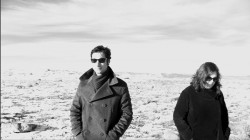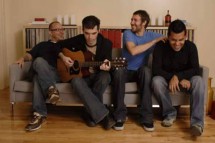Are Mumford & Sons the next Nickelback? They could be, if they aren’t careful.

Are Mumford & Sons the next Nickelback? They could be, if they aren’t careful.


What does it mean when a band hooks a “the” on its name?

If American Idol—not to mention its intranetwork rival X Factor, and even to an extent its blind-taste-test copycat The Voice—were truly a singing competition, of course, matters of styling and “marketability” would be taboo subjects, and the contestants would only focus on getting as much vocal rest time and tea as they could before their 90 seconds were up. (No taping of extraneous commercials for Ford for these kids). But of course it isn’t
id you miss out on the biggest music festivals of the season? Don’t fret—there are still plenty of ways to get involved in the music scene this spring. The following events are available for sponsorship—and while they may not be Lollapalooza, but which are cheap!
I cannot personally account for the moment at which David Lee Roth, for me, went from ubiquitous figure on the radio to beloved spirit animal and enduring life motif. Maybe it’s better not to attempt to dissect the effects of simultaneously listening closely to “Ain’t Talkin Bout Love” and devouring the epileptic prose of DLR’s […]

The kids in the crowd want lights dimmed, an apparent prerequisite to see the abs belonging to the pleasant-looking young man onstage. “Take it off! TAKE. OFF. YOUR. SHIRT.” We are at Toronto’s Korean Canadian Cultural Centre for HallyuCon, one of North America’s first conventions devoted to Korean music, and if the unnamed object of this lust isn’t an actual K-pop idol, he’s a reasonable facsimile. The physical boy-band template leaps borders like any other universalist concept, although certain male idols favor outfits that would look avant-garde on One Direction.

Tumwater, Washington, might not have turned out as much legendary music as Evergreen State cities like Seattle or Olympia, but it did birth two pioneers of sonic bludgeoning: The sludge-ripping Melvins disciples KARP and DIY art-punk heroes Unwound. A decade or so after each of those bands melted down, both trios have more or less escaped M.I.A. status. KARP stars in the awesome yet tragic documentary on record and the tour circuit throughout the ’90s—have teamed up to bring their band back from the dead. Guitarist/singer Justin Trosper, bassist Vern Rumsey, and drummer Sara Lund have launched a website replete with stories, pics, and video and released the double LP Live Leaves.

David Obuchowski of Goes Cube has been a fan of country-goth singer (and Maura Magazine pal) Edith Frost for a long while—he even wrote her a letter expressing his admiration for her work eleven years ago. Frost didn’t reply to that note, but last year a direct message on Twitter led to a few emailed […]

Years of sampledelica, instant remixes, amorphous albums, and mischief have obscured how Beck was seen at the outset of his career: He wasn’t viewed as a mere prankster, but a songwriter. Far from dooming him as a novelty, “Loser”—the deadpan 1993 single that turned him into a star—saddled Beck with the “voice of a generation” tag, thanks to his laconic, sardonic drawl embodying the slack of Generation X. To solidify his status, his songs were covered—and given a tacit nod of approval—by artists with stature. Tom Petty recorded the 1994 track “Asshole” for his soundtrack to Ed Burns’ 1996 rom-com She’s The One (in retrospect, a nifty time capsule of post-alt haziness); that same year Johnny Cash sang “Rowboat” on Unchained, his second collaboration with Rick Rubin. Both were strong indications of how Beck was viewed as part of a folk tradition that stretched back into the old, weird America.
But Beck soon shook off all the expectations, placing all his chips on the Dust Brothers’ sonic collages for 1996’s Odelay, his first major-label album after 1994’s Mellow Gold and first to be made with a wide audience in mind. Odelay is still the only one where all his contradictions are seamlessly woven together, capturing his myriad influences as well as the conflicting cultural tides of the ’90s, a time when this folk-punk terrorist rocked the hip-hop with the pantyhose and didn’t seem like a freak. Racking up a couple of hits and a Grammy, Odelay crystallized the popular perception of Beck—an ironist who is happy to tweak the collective consciousness, a one-man Beastie Boys. He never quite abandoned gravity; his rush back to folk for 1998’s Mutations established a pattern that continued when he tempered the millennial freak party Midnight Vultures with the mournful breakup record Sea Change.
Ever since that 2002 release—a proudly classicist record in its construction and intent, one that could have been passed off as a ’70s artifact—Beck has seemed bored with the very idea of the album, or even pop music.

Twenty-three years ago I became a woman, in a way. This advent of femininity did not happen in a decorated ballroom or at a presentation about “protection” presented by the school nurse; it happened at a hockey arena on Hempstead Turnpike in Uniondale, New York, during the first rock concert of my lifetime. Because during this night—on which Warrant and Mötley Crüe played—I got to see Tommy Lee’s butt for the first time.

As members of ’90s emo band Texas Is The Reason slowly walked out of the dark to their instruments at the Music Hall of Williamsburg, you could hear the dense, spiderwebbing guitars of their one instrumental, “Do You Know Who You Are?,” issue from the speakers in neat overhead streams. The stage was traced with small circular lights, as if powered by tiny, diminished suns. During their two-show 2006 reunion, the band were enhanced by dynamic, interweaving spotlights; this setup felt as if they were consciously creating a new environment, tended by warmth.
Guitarist Norman Brannon played the opening chords of “Antique”: a few drifting chords that seem very near one another, that feel naturally related, like bodies of water. Garrett Klahn sings in one note that sounds painfully excavated; it resembles a stream pushing gravel. All of the band’s music has a watery aspect, actually—each song gives off the sense that it will feed into a larger or smaller embodiment of itself.

One of my favorite musical developments of 2012 involved the return of alt-rock radio to New York City—after an abortive year as an all-news station, 101.9 FM flipped back to music, with the call letters WEMP and a playlist that, while not perfect (all those campfire-ready singalongs from Mumford & Sons wannabes!), provided the occasional surprise both new and old. While I’m awash in music “discovery” all day, from the promos I recieve in my physical and electronic mail to the songs tweeted at me by hopefuls to recommendations from friends, there’s something about hearing a fresh-to-my-ears track sandwiched in between some old reliables that still makes me more excited to drink in the new. Of course, the romance didn’t last long.